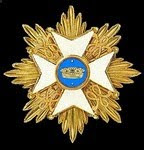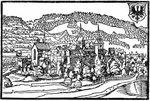Chefs: From 15th December 1743 Oberst Ludwig IX, Erbprinz von Hessen-Darmstadt, later Lieutenant-General; from 10th November 1757 Generalmajor Friedrich August von Finck, later Lieutenant-General; from 29th May 1763 Generalmajor Johann von Wunsch, later General of Infantry.
In 1756 the regiment had already been mobilised on 26th June as part of the III Corps. It moved to Lusatia in December and was then at the battle of Prague on 6th May 1757, where it was on the right wing in the first line and under Colonel von Hertzberg led the breakthrough south of Kej "at a run over the long dam at Hostawitz". (Duffy, Army of Frederick the Great, 1st Edition, henceforth AFG1, shows the grenadier battalion as having lost about 25% casualties.) It missed Kolin. The regiment was considered well-trained by its chef Hereditary Prince Ludwig von Hessen-Darmstadt.
In 1758 the regiment was part of Prince Heinrich's Saxon Corps, intended to keep the Imperial army occupied and away from the Royal army. From the end of June it was stationed at Zschopau, Pirna, and Dresden, and then in mid-October was transferred to the corps of Major General von Finck, west of the Elbe. Its grenadiers fought at Hochkirch.
It was still in Saxony in 1759 and took part in the second advance to Franconia and then with the rest of Finck's Corps joined the King's army at Lebus by 9th August. At Kunersdorf on 12th August it was involved in the opening manouevres then the attack on the Trettiner Heights (AFG1 shows about 70% casualties). The grenadiers were at Liegnitz on 15th August and lost about 45% casualties (AFG1). On 20th November the entire regiment was captured at Maxen. Wunsch had wanted to fight his way out but was forbidden.
Reformed in 1760, one battalion of the regiment served with Prince Heinrich's Corps, which advanced to the River Warta to oppose the Russians; then it was in von der Goltz's Corps. After that in 1761 two battalions served with Zieten, then with Platen at Gopstyn in September and at Spie near Kolberg in October. Finally it was in Pomerania to the end of the year.
With the King's army in Silesia, on the 21st July the regiment stormed the southern redoubt at Ober-Leutmannsdorf with the bayonet, fighting up a slope with no cover. The King gave two Pour-le-merites to its officers as a reward.
Christopher Duffy (AFG1) says: "Broken at Prague, shot up at Kunersdorf, ridden down and captured at Maxen. Surprised at Cammerswalde 7 February 1779. Brave but unfortunate." It was well regarded by the King after the war.
And this was the uniform in 1756:




















Oh I do like that colour, which is rather classy IMHO. I loved Duffy's quote at the end:).
ReplyDeleteFine looking flag. Interesting background color. “Brave but unfortunate” could be a Wargaming epitaph for many.
ReplyDeleteThanks, Steve. :-) Yes, one thing the Prussian flags do certainly have is a good variety of interesting colours! And the Duffy quotation is one of his best, isn't it? I do so enjoy his books. I really hope we get to see the long-promised book on Prague and Kolin; must drop him a line via his publishers to see if there is a chance he will be finishing it sometime...
ReplyDeleteAll the best,
David.
Thanks, Jon. :-) I always hope Christopher Duffy will have something interesting to say about the regiments I depict and, as I said to Steve, that must be one of his best epitaphs for a regiment!
ReplyDeleteAll the best,
David.
Indeed, as you say, Jon, a good epitaph for many a wargamer too! :-)
ReplyDeleteAll the best,
David.